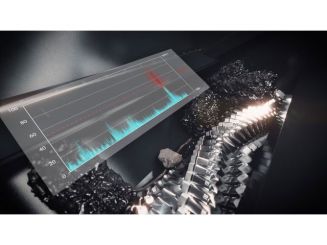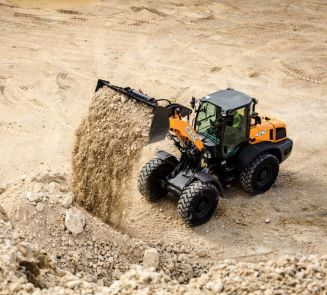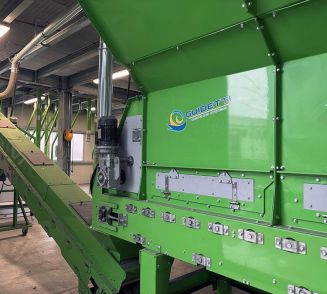The details make the difference
Vecoplan introduces new, innovative technical features to make shredding processes more efficient. For this purpose it is placing increasing emphasis on digitalisation.

Vecoplan is continually developing solutions to make shredding processes more efficient. This can be seen in a number of innovative technical features. Most important, the company is placing increasing emphasis on digitalisation. Data can be used for reliable monitoring of processes and automation of work steps. This helps operators to avoid errors that arise when shredders are set manually. It boosts the performance of the machines and extends their service lives.
“Many machine parameters that workers formerly set manually can now be managed automatically,” says Paul Mockenhaupt, who is responsible for digitalisation at Vecoplan. “For us it’s becoming more and more important to equip our machines with intelligence so that customers have better support.” With this in mind, Mockenhaupt and his team are developing technical features to improve shredding processes. One example is an electrically powered ram.
Electrical means energy-efficient
“We’ve equipped our new electrically powered ram with highlydynamic ball screw drives,” explains Vecoplan’s developer. “Thanks to the high efficiency of these components, users benefit from excellent energy savings.” An electrical system, in contrast to a hydraulic one, does not need oil that can contaminate the output material. This is becoming more and more important to customers. Another key aspect is robust design. An electrical drive requires fewer mechanical parts, and that means less wear.
“Also, as compared to a hydraulic ram, our new solution can be better controlled. Users can set the torque, and thus the pressure applied to the material, very exactly,” says Mockenhaupt. The electrical ram steadily moves the input towards the rotor on the shaft. The new variant is also more dynamic and thus faster, which raises the throughput.
Powerful direct drive
Vecoplan can optionally equip its shredders with its more powerful and efficient HiTorc direct drive, which operates economically even at higher throughputs. “A controller integrated in the frequency converter ensures that the optimum torque is available at the rotor shaft at all times and in all operating conditions,” says Mockenhaupt. As a result, the drive is extremely energy-efficient. What is more, this purely electrical solution requires no clutches, belt drives or flywheels, which means that maintenance costs are much lower. “And because mechanical components are eliminated, the mass moments of inertia in the entire drive system are also significantly reduced,” adds Mockenhaupt. “The high availability of the torque enables a problem-free start-up under load, i.e., when the shredding area is full.”
The fully automated control system uses continuous speed analysis and electrical current evaluation to detect machine overload at an early stage in the ongoing shredding process. If extraneous material is encountered, the rotor shaft will stop in just a few milliseconds, preventing damage to important components. After a short counter-rotation, the Vecoplan drive turns in the required direction again in a few seconds. The synchronous motor also has a truly impressive degree of efficiency. Compared to shredders with electromechanical drives, shredders that are equipped like this can save up to 40 per cent energy – and even up to 60 per cent compared to hydraulic drives.
Smart detection of extraneous material
Another new feature is smart, vibration-based detection of tramp material. This allows Vecoplan to keep an eye on the customer’s material and safely avoid damage to the machine. Operators can take advantage of a user-friendly measurement procedure. “Our solution is self-teaching,” says Vecoplan’s expert. When the shredder starts, sensors record all the important information, such as material properties, cutting grades and cutting geometry. The tramp material detection system adapts to the required sensitivity of the given input and environmental conditions. Operators previously had to do this manually, and it was time-consuming. Now, when the parameters change, it is only necessary to call up new settings. This can even be done remotely. “Thanks to our new material detection system, users have more than just a robust shredder. If required, the machine can even detect small stones and immediately stop without intervention from the operator,” says Mockenhaupt. “We get feedback from the sensors about the shredding process and learn how the shredder is performing. If necessary, we can optimize the process.” On request by the customer, Vecoplan will also retrofit existing machinery with the smart detection system.
Quick setting of the ideal cutting gap
Vecoplan now also offers automatic adjustment of the counter knives. “As a rule, the workers in each shift have to manually adjust the counter knives in order to correct changes in the cutting gap that can occur in operation,” explains Mockenhaupt. If the gap is too large, the shredder requires more energy because the material is crushed in the gap instead of being sliced. In such cases the output usually doesn’t have the expected quality. Manual adjustment of a machine by a worker can take from 15 to 30 minutes. “Our automatic solution reduces the time needed by a factor of ten – without requiring anyone to intervene,” says Mockenhaupt.
As soon as the shedder runs empty, the counter knives are automatically reset. This solution is valuable to customers who need to keep their machines running efficiently and effectively throughout the day. The result is also visible in the constant quality of the output. The shredder is not only more energy-efficient, it is also subjected to much less wear and therefore has a longer lifespan. “Correct manual adjustment of the counter knives also requires considerable know-how and a special feel on the part of the operator,” adds Vecoplan’s expert. “Our automatic counter knives are a true game changer. They set the gap exactly right, over and over, regardless of an employee’s knowledge and skill.”
Cooling with minimal amounts of water
Thermally sensitive plastics can soften from the heat produced at the rotor during shredding and keep the material from achieving the required output quality. Cooling water can prevent this. However, it is important to apply the right amounts. Too much water can adversely affect subsequent processes. Vecoplan has solved this by developing a minimum-quantity cooling system. “We can set the amount of cooling water at the right point by measuring the temperature of the material,” says Mockenhaupt. “Adjustable temperature limits allow us to exactly control the water supply.” The cooling water is vaporised and dissipated. If new material is fed to the shredder, there is no need to make changes to the machine itself. One only has to change the recipe for the new material. Adjustable temperature limits give users great flexibility in the choice of materials to be processed. All they need is a water connection. Expensive auxiliary equipment is not necessary. Operators can take advantage of the Vecoplan Smart Center (VSC) to monitor and record operating costs, among other factors.
“These new technical features enable us to give our customers even better support when it comes to shredding,” says Mockenhaupt. “Thanks to the smart components in these machines, their performance no longer depends on the know-how of the operator. High-quality results are achieved by means of exact, reproducible settings.” This avoids errors and saves time. “Our goal is to give our customers the best possible support.”












